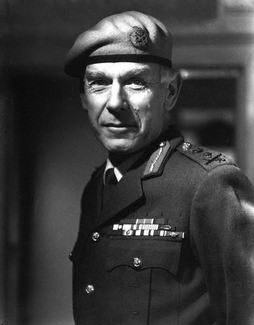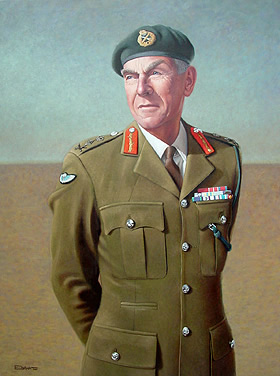<Back to Index>
- Commander - in - Chief British Forces General Peter Edgar de la Cour de la Billière, 1934
- Field Marshal of the British Army John Lyon Chapple, 1931
PAGE SPONSOR


General Sir Peter Edgar de la Cour de la Billière, KCB, KBE, DSO, MC & Bar (born 29 April 1934) is a former British Army officer who was Director SAS during the Iranian Embassy Siege and Commander - in - Chief of the British forces in the 1990 Gulf War. He is often known by the acronym DLB.
He was born as Peter Edgar Delacour to Surgeon Lieutenant Commander Denis de la Billiere and his wife Kitty Lawley. On 22 May 1941, his father was killed when his ship, HMS Fiji, was sunk by German bombers in an attack southwest of Crete.
He was educated at Wellesley House School, Broadstairs and Harrow.
He originally enlisted as a private in the King's Shropshire Light Infantry in 1952. He was later commissioned as a Second Lieutenant into the Durham Light Infantry. During his early career as an officer he served in Japan, Korea and Egypt.
In 1956, he attended and passed Selection for the Special Air Service. During his first SAS tour, he served in Malaya during the Malayan Emergency and Oman, where he was mentioned in dispatches and won the Military Cross in 1959. After his initial tour with 22 SAS, he returned to the Durham Light Infantry to run recruit training, before taking up the post of Adjutant of 21 SAS – the London based Territorial Army (reserve) SAS regiment. In 1962, he was attached to the Federal Army in Aden. In 1964, he failed Staff College but was appointed Officer Commanding A Squadron 22 SAS. From 1964 - 1966, A Squadron was deployed to Borneo for the Indonesia - Malaysia confrontation. For his actions during this period he was awarded a bar to the Military Cross.
After this tour, he re-attended Staff College, and, this time, passed. After Staff College he was posted as G2 (intelligence) Special Forces at Strategic Command. He then served a tour as second - in - command of 22 SAS, of which he was Commanding Officer from 1972 to 1974. For service in Oman, he was appointed a Companion of the Distinguished Service Order (DSO) in 1976.
He then served in a number of administrative posts before returning to the regiment as Director SAS in 1979. It was during this period that the SAS shot to public fame as a consequence of their storming of the Iranian Embassy in 1980. He was also responsible during the Falklands War for planning Operation Mikado. In 1982, he was appointed a Commander of the Order of the British Empire (CBE).
After the SAS he was appointed Military Commissioner and Commander of British Forces in the Falkland Islands from 1984 and General Officer Commanding Wales District from 1985. He was succeeded by Brigadier Morgan Llewellyn on 1 December 1987. He was General Officer Commanding South East District from 1988.
In 1987 he was appointed Knight Commander of the Order of the Bath. In 1991, he was appointed Knight Commander of the Order of the British Empire (KBE).
Despite being due for retirement he was appointed Commander - in - Chief of British Forces in the 1990 Gulf War – in effect the second in command of the multinational military coalition headed by US General Norman Schwarzkopf. His past experience of fighting in the area, knowledge of the people and some fluency in the language overrode concerns about his age. In this role, he was largely responsible for persuading Schwarzkopf (who was initially skeptical) to allow the use of SAS and other special forces in significant roles in that conflict.
By the end of his career he had risen to the rank of Lieutenant General. In order to allow him to receive the pension benefits of full general he was given the newly created sinecurist (honorarium) post of Middle East Advisor to the Secretary of State for Defence. He retired in 1992.
In August 1991, he received Canada's Meritorious Service Cross. In 1993, he received Saudi Arabia's Order of King Abdul Aziz, 2nd Class and was made a Commander of the United States' Legion of Merit.
He has written or co-authored 18 books, including an autobiography, a personal account of the Gulf War and a number of works about the SAS. The SAS traditions about not reporting operations meant that this generated considerable tension.
He was a patron of the UK based international development charity, FARM - Africa having served on the board since 1992 and as chairman from 1998 to 2001.

Field Marshal Sir John Lyon Chapple, GCB, CBE (27 May 1931 - 25 March 2022) was a career British Army officer in the second half of the 20th century. He served as Chief of the General Staff, the professional head of the British Army, from 1988 to 1992. Early in his early military career he saw action during the Malayan Emergency and again during the Indonesia – Malaysia confrontation and later in his career he provided advice to the British Government during the Gulf War.
Born the son of C H Chapple and educated at Haileybury College, Chapple undertook National Service and was commissioned as a second lieutenant in the Royal Artillery on 3 June 1950. He went to Trinity College, Cambridge, in October 1951 and, while still at University, was transferred to the King's Regiment as a second lieutenant on 4 December 1952, and to the South Lancashire Regiment also in the same rank on 20 October 1953. He became a lieutenant in the South Lancashire Regiment on 27 May 1954 and, on leaving University, was transferred to the 2nd King Edward VII's Own Gurkha Rifles (The Sirmoor Rifles) on 3 August 1954 retaining his rank as a lieutenant.
Chapple served with the regiment in Malaya, Hong Kong and Borneo and was promoted to captain on 9 February 1957 and to major on 9 February 1964. Appointed MBE in the Queen's Birthday Honours 1969 and promoted to lieutenant colonel on 31 December 1969, he was appointed Commanding Officer of 1 Battalion 2nd Gurkha Rifles in 1970 and a member of the Directing Staff at the Staff College, Camberley, in 1972. After spending much of the year as a services fellow at Fitzwilliam College, Cambridge, in 1973, he was posted to the Directorate of Staff Duties at the Ministry of Defence at the end of the year and, having been promoted to colonel on 31 December 1973 and to brigadier on 31 December 1975, was made Commander of 48 Gurkha Infantry Brigade in 1976. He became Principal Staff Officer to the Chief of the Defence Staff in 1978, and having been appointed CBE in the Queen's Birthday Honours 1980, he became Commander of British Forces in Hong Kong on 13 June 1980, with the substantive rank of major general from 1 January 1981. He returned to the UK to be Director of Military Operations at the Ministry of Defence on 19 October 1982.
Appointed KCB in the Queen's Birthday Honours 1985, he became Deputy Chief of the Defence Staff (Programmes and Personnel) on 2 January 1985 in the rank of lieutenant-general and was then appointed Commander - in - Chief, UK Land Forces, on 1 June 1987 with the rank of general from 29 June 1987. He was appointed ADC to the Queen on 6 October 1987 and advanced to GCB in the Queen's Birthday Honours 1988. His last appointment was as Chief of the General Staff from 10 September 1988. He served in this post, in which he provided military advice to the British Government on the conduct of the Gulf War, until he retired with promotion to field marshal on 13 February 1992.
He was appointed Colonel of the 2nd King Edward VII's Own Gurka Rifles (The Sirmoor Rifles) on 14 September 1986 and Honorary Colonel of the Oxford University Officers Training Corps on 21 July 1987.
He was also a trustee of the Gurkha Museum from 1973 to 2003, a trustee of the National Army Museum from 1981 to 2003, a trustee of the World Wildlife Fund UK from 1988 to 1993, President of the Zoological Society of London from 1992 to 1994 and Governor of Gibraltar from 1993 to 1995.
In 1959 Chapple married Annabel Hill; they had one son and three daughters. Their eldest daughter is Rachel Lucy Chapple, a Social Anthropologist - she has four children and lives in New York with her husband. Chapple and Hill's son is David Charles Lyon Chapple, a consultant orthopaedic and spinal surgeon; David's sons are Titus and Magnus England Chapple; David's eldest son, the late Horatio Chapple, was killed by a polar bear in Svalbard in August 2011. Chapple was once president of BSES, the charity that had organized the trip. His interests included military history.